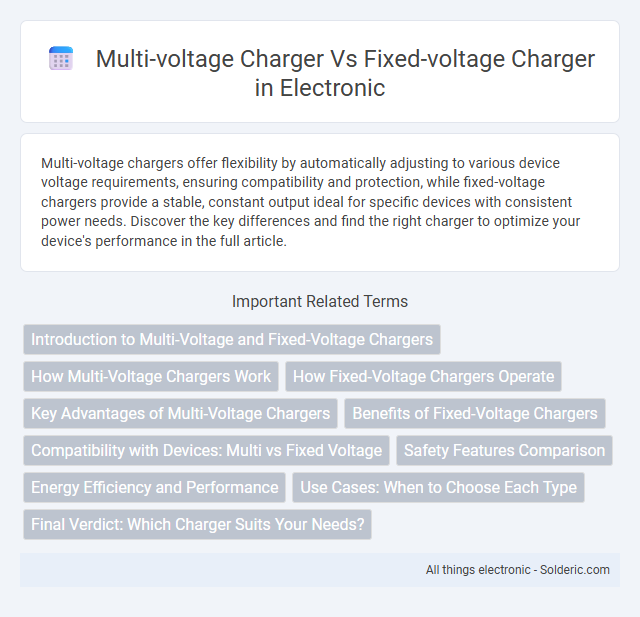Multi-voltage chargers offer flexibility by automatically adjusting to various device voltage requirements, ensuring compatibility and protection, while fixed-voltage chargers provide a stable, constant output ideal for specific devices with consistent power needs. Discover the key differences and find the right charger to optimize your device's performance in the full article.
Comparison Table
| Feature | Multi-Voltage Charger | Fixed-Voltage Charger |
|---|---|---|
| Voltage Range | Supports multiple voltage levels (e.g., 5V, 9V, 12V, 20V) | Supports a single, fixed voltage output |
| Device Compatibility | Compatible with various devices requiring different voltages | Compatible only with devices matching the fixed voltage |
| Flexibility | High flexibility for multi-device charging | Limited flexibility, designed for specific devices |
| Cost | Higher cost due to advanced circuitry | Lower cost and simpler design |
| Charging Efficiency | Optimizes voltage to improve charging efficiency | Standard efficiency limited to fixed voltage |
| Use Case | Ideal for users with multiple device types | Suitable for single-device use |
Introduction to Multi-Voltage and Fixed-Voltage Chargers
Multi-voltage chargers offer adjustable output voltages, making them compatible with a wide range of electronic devices, enhancing versatility and convenience. Fixed-voltage chargers provide a constant, predetermined voltage output tailored specifically for certain devices, ensuring stable charging performance. Understanding the differences between these charger types helps in selecting the optimal power supply based on device requirements and usage scenarios.
How Multi-Voltage Chargers Work
Multi-voltage chargers automatically detect and adjust to the appropriate voltage required by your device, ensuring safe and efficient charging across different electronics. This is achieved through built-in sensors and smart circuits that regulate power output based on the device's input specifications. You benefit from versatility and protection against overcharging or damage, which fixed-voltage chargers cannot provide.
How Fixed-Voltage Chargers Operate
Fixed-voltage chargers operate by delivering a constant voltage output regardless of changes in the battery's charge state, ensuring a stable and predictable charging environment. They maintain a preset voltage level, which can lead to overcharging or undercharging if the battery's voltage deviates significantly from the fixed value. This simplicity makes fixed-voltage chargers cost-effective but less efficient for batteries requiring dynamic voltage adjustments during charging cycles.
Key Advantages of Multi-Voltage Chargers
Multi-voltage chargers offer significant flexibility by supporting a wide range of devices and battery types, making them ideal for users with diverse electronic equipment. They optimize charging efficiency by automatically adjusting voltage output to match the specific requirements of each device, enhancing battery health and lifespan. This adaptability reduces the need for multiple chargers, thereby saving space and cost while promoting convenience and portability.
Benefits of Fixed-Voltage Chargers
Fixed-voltage chargers provide consistent and stable power output, reducing the risk of overcharging and extending the lifespan of your battery. Their simplicity ensures easy installation and compatibility with specific devices, minimizing the chances of electrical faults. This reliability makes fixed-voltage chargers ideal for applications requiring precise voltage regulation without frequent adjustments.
Compatibility with Devices: Multi vs Fixed Voltage
Multi-voltage chargers offer broad compatibility, automatically adjusting to suit devices with different voltage requirements, making them ideal for users with diverse gadgets. Fixed-voltage chargers provide power at a single voltage level, limiting their use to specific devices designed for that exact requirement. Your choice depends on the variety and voltage specifications of your devices, with multi-voltage chargers ensuring greater flexibility and safety.
Safety Features Comparison
Multi-voltage chargers incorporate advanced safety features such as overvoltage protection, temperature control, and automatic voltage adjustment, significantly reducing risks of device damage or battery overheating. Fixed-voltage chargers, while simpler and more cost-effective, generally lack adaptive safety mechanisms, making them more prone to issues like overcharging or short circuits if incompatible with the device. The enhanced protection systems in multi-voltage chargers provide superior electrical safety and device longevity, crucial for applications requiring versatile charging solutions.
Energy Efficiency and Performance
Multi-voltage chargers optimize energy efficiency by adjusting output to your device's specific power needs, reducing energy waste compared to fixed-voltage chargers that continuously supply a constant voltage regardless of demand. This adaptive performance ensures faster charging times and minimizes heat generation, prolonging battery life and enhancing overall device safety. Choosing a multi-voltage charger improves energy consumption and provides reliable power delivery tailored to various electronic devices.
Use Cases: When to Choose Each Type
Multi-voltage chargers are ideal for users who need flexibility to charge a variety of devices with different voltage requirements, making them perfect for travel, professional technicians, or environments with diverse electronics. Fixed-voltage chargers suit consistent, single-device charging scenarios where reliability and simplicity are key, such as charging standard household gadgets or specific batteries with known voltage specifications. Your choice depends on whether you prioritize adaptability with multi-voltage options or streamlined efficiency with fixed-voltage chargers.
Final Verdict: Which Charger Suits Your Needs?
Choosing between a multi-voltage charger and a fixed-voltage charger depends on your device compatibility and charging flexibility. Multi-voltage chargers offer the advantage of adjusting to different voltage requirements, making them ideal for travelers or users with multiple gadgets. Your decision should prioritize convenience and device protection to ensure optimal charging performance.
Multi-voltage charger vs Fixed-voltage charger Infographic

 solderic.com
solderic.com